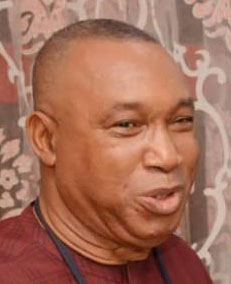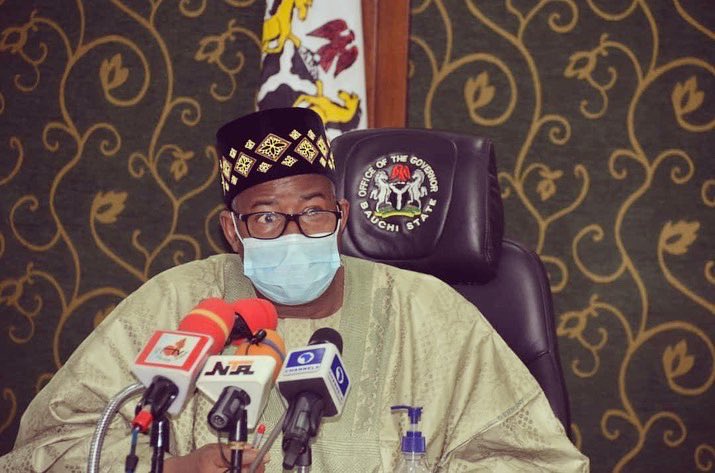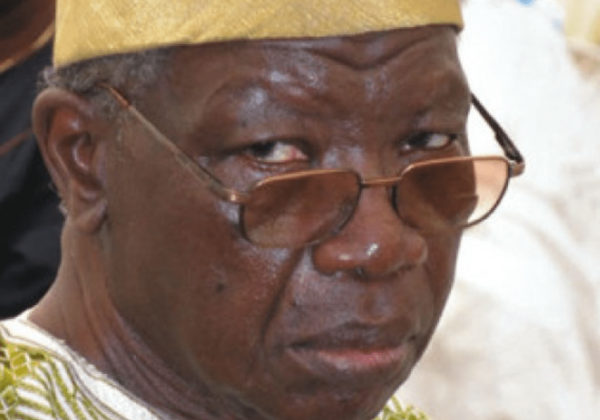Many will remember the rhetorical question posed by Asiwaju Bola Ahmed Tinubu when accusing fingers started pointing at the Fulani, as the culprits in the unfortunate murder of Mrs. Funke Olakunrin, daughter of Afenifere leader, Chief Reuben Fasoranti. When asked to comment on the murder, Tinubu asked: “…Is Evans a Fulani herdsman”?
Tinubu was referring to Evans, who is now standing trial for allegations of kidnapping and extortion of money from victims. To be sure, by referring to Chukwudi Onuamadike, alias Evans, many people of Igbo extraction interpreted it as a dig at their race. After all, since Mrs. Olakunrin’s killers were presumed to be looking for money, Tinubu might as well have asked: Is “Dr”. Ishola Oyenusi or Shina Rambo Fulani? Oyenusi (Yoruba by tribe), was the notorious armed felon who, in the early seventies, led a series of carjacking and bank heists that, for several months, defied the best investigative effort of Nigeria’s security agencies, until he was apprehended after leading the Boulos Factory robbery of 1971. Similarly, Shina Rambo, was the dare-devil robber who terrorized Lagos and environs in the mid-nineties leaving a trail of blood as he made nonsense of Nigeria’s security apparatus. He too was later checkmated.
On the identity of the murders of Mrs. Olakunrin, Tinubu had this to say: “I am extremely bothered about security but I don’t want stigma. I can go through the history of kidnapping and we know how it started, where it started, there are lot of copycats; how many years ago have we faced insecurity in this country and cases of kidnapping? Is Evans a herdsman?”
I have recalled the two episodes to remind us that ethnic profiling has never been encouraged by the society. Neither Oyenusi nor Shina Rambo (both Yoruba by tribe) or even Lawrence Anini (Edo by tribe) were of the Igbo or Fulani stock. That was the implication of Tinubu’s riposte to the accusation that, the Fulani had killed the daughter of the Yoruba leader.
Advertisement
By some uncanny coincidence, that dastard criminal act was carried out in the same Ondo State where, a few weeks ago, the State Governor, the indefatigable and fearless Oluwarotimi Akeredolu, SAN, issued an eviction order on Fulani herdsmen in the state. The controversies and actions that have trailed Akeredolu’s order have reached fever pitch and the nation is searching, or is it groping, for a path out of the conundrum.
Thus when, last week, the Bauchi State Governor, Senator Bala Mohammed, tried to rationalise the circumstances of the Fulani herdsmen by saying they armed themselves with AK47, in self-defence, he obviously did not expect a slap in the wrist from Nigerians. Understandably, many have kicked against his statement for the well-founded reason that, there is no questioning the culpability of some Fulani herdsmen in the sordid spate of crimes that not only dehumanise people but now threaten the very survival of the country.
Actually, contrary to the impression created, anyone who knows Bala Mohammed will agree that he would never dispute a claim that the Sultan of Sokoto and MURIC have ostensibly corroborated. Be that as it may, in the nature of things, the impression that has gained ground is that Bala Mohammed’s primary intent was simply to support a kin-group to which he only tangentially belongs. However, from the explanation of his spokesman, Comrade Gidado Mukhtar, that was not his intention. According to Mukhtar, “at no time did the Governor set out to justify criminality by anyone, no matter the person’s ethnic nationality. Rather, he admonished us, in the interest of national unity, to avoid wholesale branding of any ethnic group as it is inconceivable that any one group can be made up of only criminals”.
Advertisement
Fortuitously, appearing on a TV programme last Tuesday, two days before Bala Mohammed’s statement, Femi Otubanjo, retired professor of political science at the University of Ibadan, maintained the same position. To him, all the hoopla can be avoided by addressing the people by their occupation as “herdsmen” (emphasis mine), so that the over 70 percent of Fulani people who are engaged in other occupations in the urban areas, would not be stigmatized by the wholesale profiling of their ethnic group as criminals.
Just as no one can dismiss the obvious culpability of some people of Fulani extraction in the unconscionable blood-letting and bestiality that has killed many and defiled women, no one can sweep aside the genuine fear, as expressed by Bala Mohammed, that the ethnic profiling of Fulani could lead to unpleasant actions against them. Are we not already there? Apart from the Sunday Igboho expedition against the Fulani in Ibarapa, today, all over much of the South West, people of Fulani extraction now live in fear.
Anyone who saw last Monday’s lead headline and photograph, on the front page of the Daily Trust newspaper, would certainly begin to appreciate the perspective from which Bala Mohammed made his statement. In the photograph, distraught Fulani women and children could be seen, apparently heading to nowhere.
The main thrust of Bala Mohammed’s admonition was for leaders to avoid statements that could exacerbate Nigeria’s already disquieting faut-lines with the reminder that, given the convergence of ethnic nationalities all over the country. In this regard, his aim was to guard against a throwback to our historical experience whereby retaliatory actions could lead, and this time around, to an unmanageable implosion.
Advertisement
Anyone familiar with the concern and despair caused each time some Northern Youth, under the leadership of Yerima Shettima, issued those ultimatums asking people of Igbo extraction to leave the North, will readily appreciate Bala Mohammed’s concerns. As he forewarned, events of the past few weeks point to a precipitous descent to the nadir of ethnic intolerance and a misguided escalation of the rhetoric of war and national destruction.
Sadly, at times like this, when people seek to make political capital out of every situation, Bala Mohammed, by his figurative reference to AK47, has placed his neck on the slaughter slab of political opportunists. Ironically, his statement reminds one of the call, in 2018, on the people of Taraba, by no less a person than General T.Y. Danjuma, to take up arms to defend themselves.
If the Bala Mohammed, a nationalist and compassionate Nigerian with whom I have been associated for close to forty years, is sure that staking his political career, even his life, will restore inter-ethnic harmony, and place Nigeria on the path of greatness, he will readily make the sacrifice. He has done so in the past.
Ten years ago, when the nation stood on tenterhooks, as uncertainty trailed the fate of the country, following the death of Yar’Adua, it was Bala Mohammed that broke the ice. Recall that some hawks in what looked like a near consensus by the north, were hedging on President Jonathan, then vice president of the country, succeeding the ailing Yar’Adua. It was Bala Mohammed’s Integrity Group in the Senate who pushed the Doctrine of Necessity motion, that paved the way for Jonathan, the “shoeless” boy from South-South Nigeria, to become President. Last December, while flagging off some of the projects that have become the trademark of the Bala Mohammed Administration, former Senate President, David Mark, reminded Nigerians that it was the statesmanlike conduct of Bala Mohammed and his ilk, that provided the impetus for the success recorded by the National Assembly (NASS) under his (Mark’s) leadership. Perhaps the greatest success of that era was in breaking the Yar’Adua succession logjam.
Advertisement
Similarly, as minister of the Federal Capital Territory between 2010 and 2015, Bala Mohammed ran an administration that, apart from its record in infrastructural development, set very high standards, in diversity management and gender inclusion. I am not surprised that since the unfolding of his statement, a number of members of the Nigerian Guild of Editors (NGE) and the Newspapers Proprietors Association of Nigeria (NPAN) with whom he had very close interactions in 2013, have called to express worries that someone whose stature as a nationalist and statesman portended so great a promise for the country, could allow himself to be sucked into the vortex of an unforgiving political inferno. My simple response is that, before we crucify Bala Mohammed, from what they know about him, it will be unfortunate to allow this one incident to define a man whose belief in and commitment to a united, peaceful and prosperous Nigeria remains undiluted, in spite of these trying times. Even at that, he meant well.
That said, all hands must be on deck to resolve these issues. In my view, the first immediate solution is to assuage the hurt of the victims of the actions, of the strange Fulani herdsmen in our midst. By the same token, those Fulani who have suffered collateral damage because of the untoward behaviour of some of their kinsmen also deserve the compassion and apology just as all the parties in this unfortunate saga, deserve restitution.
Advertisement
Yet, as these efforts are being made, it is only when justice has been done by apprehending and prosecuting the accused herdsmen, Fulani or by whatever tribe, that closure can be brought to the families of the deceased and as well as victims of rape. Furthermore, admitted that itinerant Fulani have always been with us, the Federal Government, in collaboration with states and local governments, should rid the country of those strange herdsmen whose culture and motives are at variance with our national ethos. Then, and only then, can peace return to Nigeria.
Advertisement
Views expressed by contributors are strictly personal and not of TheCable.
1 comments








It is unfortunate that Emma Agu has not left his cash and carry journalism, cultivated since his days at Champions Newspapers. It is mind boggling that he classified Gov. Bala Mohammed as a tangential Fulani, forgetting that despite his sumptuous wealth, Bala remains a big time herder, at least, in Abuja that I know. Bala meant what he said and said what he truly believed in. Please, always read Emma Agu with caution, because, he can’t change his mercantile approach to journalism.